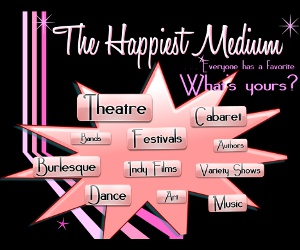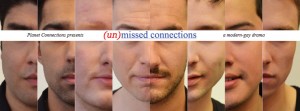Okay now, stay with me: Jamie used to be with Eric until Eric realized they were basically incompatible, though Jamie doesn’t understand why. Caleb, unattached, takes up with Jamie, though he feels basically incompatible with everyone. Jamie suspects Caleb is cheating and answers an ad on line seeking a massage while pretending to be Caleb. Bruce actually just wants a massage, because something has prevented him from being the masseur he used to be. Bruce’s favorite clients were Simran and Daniel, who have now broken up, and have less time for Bruce since he stopped giving massage. Simran has discovered Daniel is cheating and in a swiftly co-ordinated move has left, taking lock, stock, and barrel, without notifying Daniel. Daniel dramatically discovers he has been rumpled only after he has brought Caleb home for sex. Down at the STD clinic, Eric meets Simran and suggests that maybe they could be compatible. Is that all perfectly clear?
Such elaborately contorted routes of connection and coincidence might seem to strain credibility if it weren’t so true to the actual complexion of sexual social life in the contemporary gay male community. Arthur Schnitzler penned a play in 1897 which became known as La Ronde, outlining almost precisely this pattern of sexual interaction amongst heterosexual couples of the period. That play became a cause scandale, trespassing on moral codes and class divisions, alluding to uncomfortable issues of sexual and social exploitation, and raising the spector of – shudder to murmur it – sexually transmitted disease. Published in 1900 that play is now an august 112 years old. Have we come a long way baby, or is Mark-Eugene Garcia‘s (un)missed connections really more of the same?
It can’t be more of the same because, yes, society has in large measure unbuttoned to a degree where none of these events are considered even mildly scandalous. The sexual dalliance of two openly gay men only rarely offers the potential for social embarrassment. Sexual mores, by and large, have moved on from being shocked by infidelity to such a point where its opposite, over a lifetime, is considered more peculiar. And STDs? Well, come on! So what is there left from the bones of Schnitzler’s dramatic premise for playwright Garcia to play with? Only connection; that great human theme – and the part that sex plays in establishing and, more pointedly, undermining it. It’s frankly a big theme, and the burning soul at the heart of both Garcia’s and Schnitzler’s works.
(un)missed connections hardly pays attention to social backgrounds, or even psychological histories. Its characters are all just on the horns of a situation, a situation prompted by sex. More specifically they are men who have a great sense of a missed opportunity, something that could answer the question of who they truly are; something that could show them themselves. In the face of this enduring quest, fragile humanity is characteristically evasive. Skittish, non-committal, these men throw themselves into situations they aren’t adequately prepared for, no matter how steeled they may feel against intimate trespass. Structured into several acts featuring different couples in dialogue, Garcia’s play first offers us Jamie – a soft-hearted, seemingly harmless character, who impulsively tries passing himself off as Caleb. And as a masseur. Not surprisingly, in short order he is exposed as fraudulent and out of his depth. He is lucky in encountering someone like Bruce in this instant, who is a sucker for a truthful sob story. Bruce opens up Jamie about his troubles and ends by giving him the massage, even as his cramped hands protest at their work. This exchange encapsulates the other experiences shown here and, in the spirit of a gentle, comedic humanitarianism, ensures that nobody suffers too severely. Remorse there is, and psychological shadow, but rather generously each character is given a break. Garcia is sharp enough never to suggest anyone’s travails are at an end, and indeed, with a note of poetic realism, most of the men end their scenes hardly wiser than they were when they began. In a clever conceit, any shade of connection that results here, stems from the ability to acknowledge a missed connection. The hamster wheel of desire is driven by the urge to put a face on ourselves, and as only Eric – the “arty” one – can testify, following an encounter with the artist Marina Abramovic‘s “The Artist is Present” installation, facing yourself is hard. Hard!
Garcia keeps this potentially dark matter light, and quite artfully, given all the potential mines and sinkholes. There is, however, something of a sameness in the voices he gives his disparate characters, despite a skillfully selected cast. Perhaps director Rodrigo Bolaños might have tweaked his performers more aggressively to compensate. Other directions that served to suggest a universality to the stories were clever, but unnecessary, and a bit stagey for my taste. The set and lighting effects (Sean Lum) are spare and lean, and effective for it. Jaspal Binning (Simran) and Kyle James Johnson (Jamie) are the most effective at finding distinctive individual voices for their characters. As a thoughtfully crafted dessert, (un)missed connections hones close to the sweet, though never loses sight of the bitter. It won’t make your teeth sing, and won’t leave you with that uncomfortable feeling of too full.
~~~
(un)missed connections Benefiting: GLAAD (Gay & Lesbian Alliance Against Defamation) Produced/Written by Mark-Eugene Garcia Directed by Rodrigo Bolanos.
$18 General Admission $9.00 for Film/Music Participants FREE for Theatre Festivity Participants
Wednesday 6/6/12 @ 9:00pm Monday 6/11/12 @ 10:00pm Tuesday 6/12/12 @ 7:00pm Sunday 6/17/12 @ 10:00pm Sunday 6/24/12 @ 1:00pm
. 55 minutes .
At Bleecker Street Theatre (Downstairs) 45 Bleecker Street, New York, NY 10012 Conveniently located near: Bleecker St (4 & 6) Broadway – Lafayette St (B, D, F, M) Prince St (N, R)
Click Here to purchase tickets









{ 0 comments… add one now }